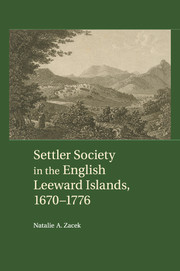Book contents
- Frontmatter
- Contents
- List of Tables
- Acknowledgments
- Map
- Settler Society in the English Leeward Islands, 1670–1776
- Introduction
- 1 The Challenges of English Settlement in the Leewards
- 2 Irish, Scots, and English
- 3 Managing Religious Diversity
- 4 Sex, Sexuality, and Social Control
- 5 Political Culture, Cooperation, and Conflict
- Conclusion
- Bibliography
- Index
- References
1 - The Challenges of English Settlement in the Leewards
Published online by Cambridge University Press: 05 July 2011
- Frontmatter
- Contents
- List of Tables
- Acknowledgments
- Map
- Settler Society in the English Leeward Islands, 1670–1776
- Introduction
- 1 The Challenges of English Settlement in the Leewards
- 2 Irish, Scots, and English
- 3 Managing Religious Diversity
- 4 Sex, Sexuality, and Social Control
- 5 Political Culture, Cooperation, and Conflict
- Conclusion
- Bibliography
- Index
- References
Summary
INTRODUCTION
In recent years, historians of colonial America have become accustomed to including the larger British, as well as the French, Spanish, and Dutch, colonies in the West Indies on their mental maps of the Atlantic world. The Leeward Islands, however, have for the most part remained literally on the margins of that world, with many scholars still uncertain about their precise location or about which individual islands made up the Leeward colony. The very term “Leeward Islands” is a purely relational one, which owes its origin to the need of London-based administrators to distinguish between Barbados, the first of England's colonies to commit to large-scale sugar production and African slavery, and the more northerly and easterly islands, which until 1670 were essentially Barbados's colonies. In 1995, the historical geographer David Lowenthal dubbed these islands the “wayward Leewards” and described them in the following terms:
Marginality is the key to [the] distinction between the Leewards and the rest of Plantation-America, especially the rest of the Caribbean.… Leeward Islanders have more in common with small islanders elsewhere from the Pacific and the Indian Ocean to the Mediterranean and the North Sea, than with the rest of plantation America, even the Caribbean.
Lowenthal's statement echoes that made more than half a century earlier by the imperial historian Ruth Bourne, who described the Leewards as “the hottest, the most disease-ridden, the most subject to earthquake, and the most open to Maroon and enemy attacks of all England's possessions … the most undesirable place imaginable to live in.”
- Type
- Chapter
- Information
- Publisher: Cambridge University PressPrint publication year: 2010



